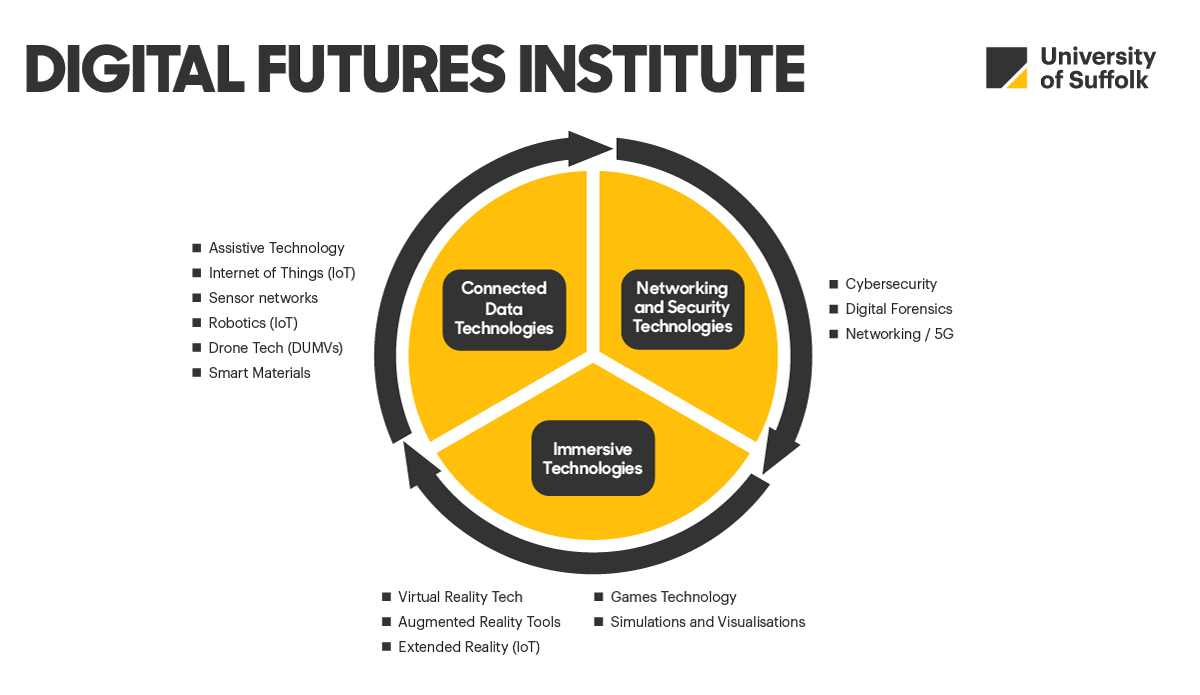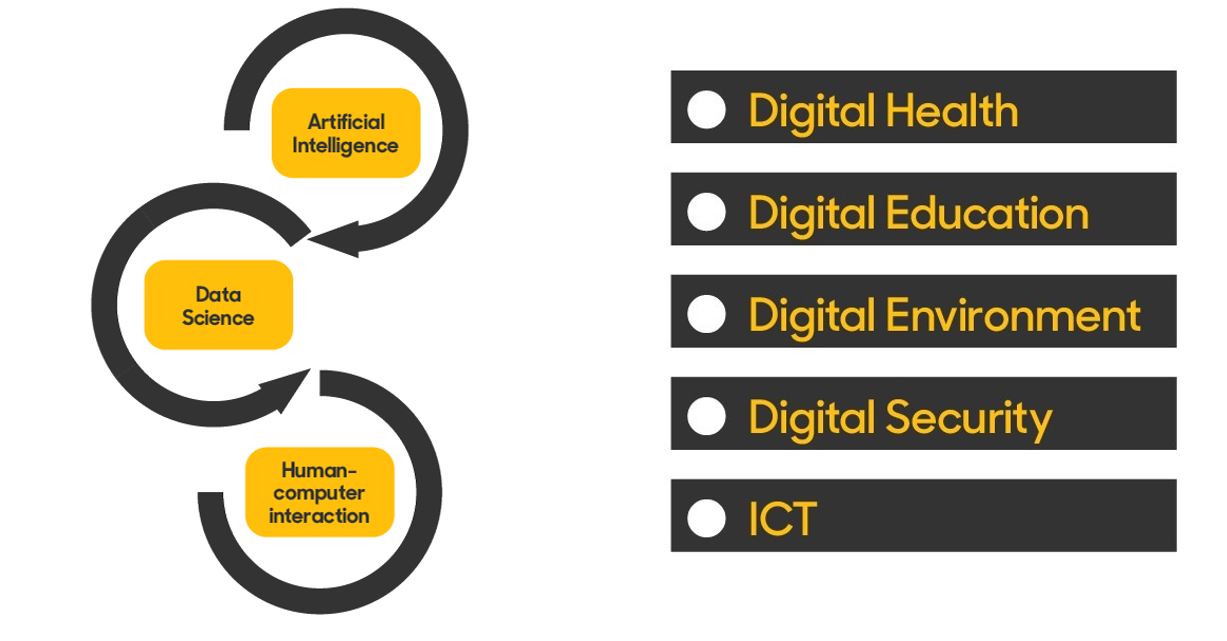Digital Futures Institute - Themes
/prod01/channel_2/media/uniofsuffolk/website/content-assets/images/destination-suffolk/_18A3726-3364X4480.jpg)
The Digital Futures Institute draws in from a wide range of technology expertise areas from University of Suffolk academics and BT plc Research and Development. To reflect this broad range of expertise, we have organized ourselves into three main technology theme areas:
-
Immersive Technologies
-
Connected Data Technologies
-
Networking and Security Technologies
Our cross-cutting research focus areas include: human-computer interaction, artificial intelligence and data science. We adopt a wide range of research and development methodologies, are evidence-based and use co- and participatory design approaches.
We work closely with researchers and developers at BT plc, as well as other key partners including Suffolk County Council, NHS East of England and OfCom. We also work with Innovation Martlesham with its cluster of 155 ICT companies. To find out more about our approach and partnerships, contact digitech@uos.ac.uk

Using Immersive Technologies such as virtual reality, augmented reality, extended reality, games technologies and simulations and visualisations, we can provide technical solutions to a wide range of real world problems and challenges. These technologies can deliver immersive experiences in many different contexts, including digital education and digital health.
Key Researchers:
Key Partners:
BT plc, NHS, Orbital Global Group, Suffolk County Council
Areas of Interest:
Immersive experiences can be designed and developed in different ways, we work with the partner through student projects (3 months - 1 year), collaborative R&D and our Doctoral Students to deliver just in time digital solutions to a wide range of problems and challenges. Through our Challenge Labs and Ideation methods we engage and co-design solutions with our stakeholders. We focus upon usability (HCI), artificial intelligence and data science principles to create unique and memorable experiences. If you are interested in working with us to solve your problem, we have a range of ways you can get involved. Email digitech@uos.ac.uk to find out more.
Current Projects:
Suffolk Stories is an Educational Heritage Game Trail that teaches about Thomas Wolsey’s history and life in Ipswich. The project is a proof-of-concept participatory design game which collects archival information. Timed for the start of the Thomas Wolsey 550 Anniversary celebrations, the proof of concept is already leading to new projects. The project combines sensor technology, game play and digital and virtual spaces to provide a new approach to teaching in Trail Walks. The Project is a collaboration between The Hold (Suffolk County Council), the University of Suffolk’s Digital Futures Institute and Centre for Culture and Heritage and BT plc
Future Projects:
Trail Walks will take the Suffolk Stories PoC to demonstrator and full service level. Exploring narrative and story through role play of significant characters. We will work with regional heritage partners to deliver exciting experiences that traverse physical, digital and virtual spaces.
Dreamworld will consider the use of pain therapy through immersion in gameplay. Following the successful Snowworld application for pain relief, we will test different methods of pain relief available towards developing a full game for therapy.
For us, Connected Data Technologies bring together data-driven and AI-focused approaches using assistive agents and smart technologies to refine, improve and accelerate activities. As part of our commitment to digitization, ambient technologies are a good source of data for our analysis and assistive technology focus. Using ambient technology, network sensoring, data analysis and AI scaffolding we are focused upon applications in a range of sectors including education and health.
Key Researchers:
Key Partners:
BT plc, NHS, Suffolk County Council
Areas of Interest:
Through digital twinning and living labs these 'technology stacks' we can extract large data sets that can be modelled to make improvements in our lives. Through methods such as digital twins and living labs, we are working with BT plc to deliver working prototypes in areas as diverse as education, health and ICT development. Our focus is on developing data modelling techniques and AI assisted technologies to get the best out of our services and social interactions.
Secure Technologies are central to our technological and personal, social and cultural safety in our digital world. But today, our digital systems, networks and communities are under attack. What can we do to protect our schools, colleges and universities from cyber attacks and how can we build in more resilience to our systems and communities to resist radicalisation, bullying and grooming. Working with BT plc research and development, we are exploring how we can build in greater resilience to our digital networks and technologies through advanced computing and engineering approaches.
Theme Lead:
Key Researchers:
- Professor Ben Azvine
- Professor Peter Cochrane
- Dr Hisham Jaward
- Andrew Jones
- Dr Maina Korir
- Dr Chris Lewington
- Dr Felix Ngobigha
Key partners:
Future Projects:
Digital Identities are under attack in the digital world. This project will work with Ofcom and BT plc to explore how are digital identities are changing and what educational and technical steps we can take to ensure that our children and adults remain safe from radicalisation, cyber bullying and online predators.
/prod01/channel_2/media/uniofsuffolk/website/content-assets/images/studentsx2fstaff-on-campus/open-days/Open-Day_students-(5).jpg)
